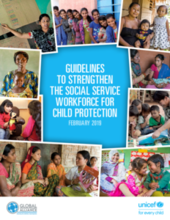The new UNICEF Guidelines to Strengthen the Social Service Workforce for Child Protection have been developed in close consultation between the Global Social Service Workforce Alliance and UNICEF Headquarters, Regional and Country Offices. They are informed by evidence of ‘what works’ and lessons learned from the field and are designed to accelerate UNICEF regional and country programming to better plan, develop and support the social services workforce with national and regional partners. Social service workforce strengthening is a programme priority for UNICEF and key to achieving multiple Sustainable Development Goal targets and Goal 3 of UNICEF’s Strategic Plan.
The Guidelines are intended to complement the Programme Guidance on Preventing and Responding to Violence Against Children and Adolescents (Programme Guidance on VAC), recognizing that a qualified social service workforce, paid and unpaid, government and non-governmental professionals and para-professionals are often the first line of response for children and families and the most important element of a well-functioning child protection system.
The social service workforce works alongside children, families and community members. They are the most important element of a well-functioning child protection system. The workforce plays a critical role in alleviating poverty, identifying and managing risks, and facilitating access to and delivery of social services to enhance child and family well-being. A well-developed social service workforce is also key to promoting social justice, reducing discrimination, challenging and changing harmful behaviors and social norms, and preventing and responding to violence, abuse, neglect and exploitation and family separation.
View toolkit here.

